Dental Crowns Conyers
Extra Strength & Protection for Compromised Teeth
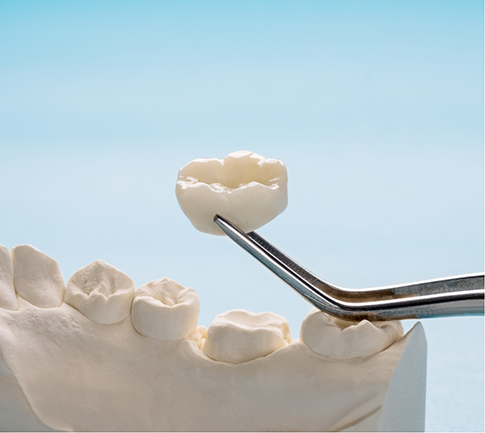
Did you know that over 15 million people in the United States have dental crowns? It’s incredibly common for teeth to become damaged or decayed enough to require a little added support, and dental crowns in Conyers offer just that. Dr. Peters and our team use high-quality materials to provide our patients with long-lasting dental crowns that are designed to help preserve your natural teeth. Call us today to learn more about this restorative treatment or schedule an examination.
Why Choose Hillcrest Dentistry for Dental Crowns?
- Durable Metal & Non-Metal Dental Crown Options
- Dental Insurance Accepted & Financing Available
- Judgement-Free, Friendly & Knowledgeable Dentist
What Is a Dental Crown?
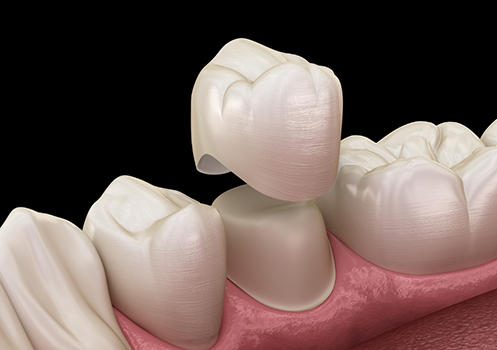
Simply put, a dental crown is a cap-like restoration designed to be placed on the top portion of a tooth. It’s cemented to the natural tooth structure and restores its strength, function, and beauty from the gumline up. Examples of situations where our time may recommend getting a dental crown include:
- Advanced decay that a filling won’t fully address.
- Damage to the tooth from an injury.
- Excessive wear on a tooth.
- Preparation for a dental bridge.
- Covering dental implants to replace a single missing tooth.
- Correcting the appearance of a cracked, broken, or misshapen tooth.
The Process of Getting a Dental Crown
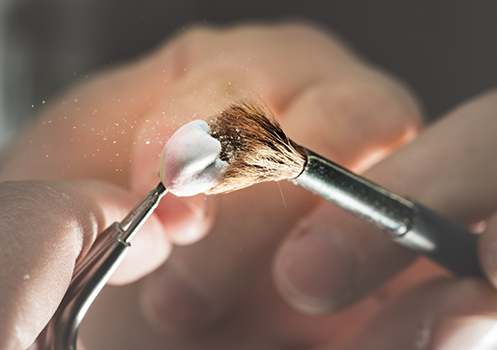
To start, our team will prepare the affected tooth by removing a small amount of enamel to allow the restoration to fit over it. We’ll then capture an impression of the tooth that we’ll send off to our laboratory. There, they’ll craft your crown from zirconia, porcelain, gold, or porcelain fused to metal and send it back to our office. Our team will check to make sure it fits perfectly and looks great before permanently cementing it onto the prepared tooth.
Benefits of Dental Crowns

Dental crowns offer some truly outstanding benefits:
- Improves appearance: Crowns can enhance the shape, color, and alignment of teeth for a natural look. Many patients opt for materials that blend in seamlessly with the nearby dentition.
- Provides protection: Crowns shield vulnerable teeth from further damage or infection. They can even help to prevent the need for tooth extractions!
- Enhances function: Crowns strengthen weak teeth, so they can make it easier to speak and chew comfortably.
- Long-lasting solution: High-quality crowns can last many years with proper care and maintenance. In fact, they often endure for a decade or longer.
Understanding the Cost of Dental Crowns
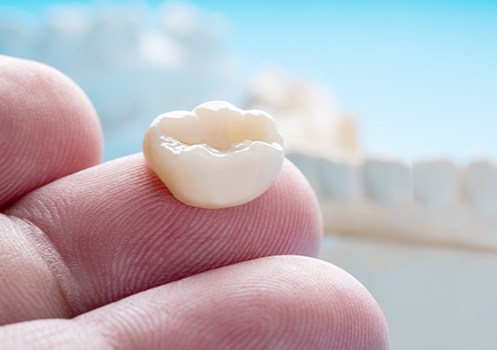
Your financial situation shouldn’t prevent you from properly restoring your smile with the help of a dental crown. However, because each situation is as unique as your grin, there isn’t one set price for this treatment. At Hillcrest Dentistry, we want to assure you that we’re committed to keeping the cost of dental crowns affordable for every patient, and that you’ll never need to compromise on the appearance or durability of your restoration to fit this treatment into your budget.
Factors that Affect the Cost of Dental Crowns
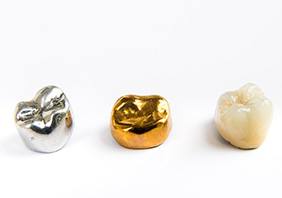
There are many factors that can affect the cost of a restoration such as a dental crown. These include:
- How severe the damage is to your tooth, and whether other procedures are needed first, such as a root canal.
- The type of material used to make your dental crown, such as zirconia, gold, porcelain, or porcelain fused to metal.
It is also important to remember that just because a crown is cheaper, that doesn’t make it better. Quality matters, especially for something that will be going in your mouth. You want your new crown to not only look great but also feel great and last for many years!
Does Dental Insurance Cover Dental Crowns?
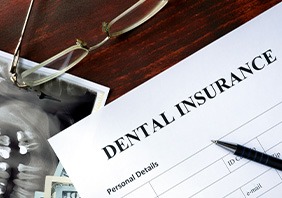
Yes, dental insurance considers dental crowns a “major procedure” and will often cover around 50% of the cost of treatment if deemed medically necessary; however, as each plan differs, this will depend on your individual plan. At Hillcrest Dentistry, our team is happy to help you verify your dental insurance coverage before beginning any work on your new dental crown.
Other Options for Making Dental Crowns Affordable

In addition to proudly being in-network with MetLife dental insurance, Hillcrest Dentistry is happy to accept all PPO dental insurance plans. Additionally, we are glad to accept payment plans from our preferred third-party lender, CareCredit. These plans can break up the cost of your dental treatment into multiple, low-to-no-interest monthly payments that are better suited to your financial situation.
At Hillcrest Dentistry, we’re here to help manage the cost of your dental crown treatment. If you’d like to learn more about your financial options, please schedule a consultation with us today by visiting our website or calling us directly at 770-922-1666.
Dental Crowns FAQs
How Long Do Dental Crowns Last?
You can expect your dental crown to last for many years with proper care. Most crowns endure between 10 and 15 years, although some may last even longer if you maintain excellent oral hygiene and attend regular dental checkups. Factors such as grinding your teeth, chewing hard foods, or neglecting your oral health can shorten their lifespan. We recommend brushing and flossing daily and scheduling routine dental visits to maximize the longevity of your crown.
How Do You Know When a Dental Crown Needs to Be Replaced?
You may notice signs that your dental crown needs replacement, such as discomfort, visible cracks, loosening, or changes in appearance. Sensitivity around the crowned tooth, especially while eating or drinking, can also indicate that the crown is failing. If you detect any unusual sensations or damage, contact us so we can assess the situation and recommend appropriate care.
We will thoroughly examine your crown during your regular visits to ensure it remains stable and effective. Should you need replacement, we will discuss your options and design a new crown that fits comfortably and looks natural.
Do Dental Crowns Get Cavities?
While dental crowns in Conyers themselves do not develop cavities, the tooth beneath can still be vulnerable to decay if plaque accumulates around the crown’s edges; bacteria can sneak beneath the restoration and lead to problems. Good oral hygiene, including thorough brushing and flossing, can greatly reduce the risk of harm to the tooth beneath a crown. It is also important that you monitor your crown for damage. If it is cracked or loose, bacteria could more easily reach the underlying tooth.
Does It Hurt to Get a Dental Crown?
Getting a dental crown is typically a comfortable process. We use local anesthesia, so you should feel very little when we are preparing your tooth for your restoration. You may experience some mild soreness or sensitivity after the anesthesia wears off, but this usually subsides within a few days. If you feel discomfort, over-the-counter pain relievers and gentle oral hygiene may take the edge off. You might also need to eat a soft and mild diet for a few days to reduce sensitivity.
If you experience any severe or prolonged pain, that might mean that there is a problem with your tooth or your crown. You should contact us right away so we can assist you.
